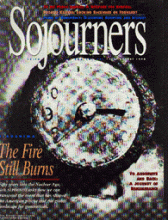Retro is a term used by graphic artists to describe a style of American design from the 1950s. It's known for its thick lines, block type, and pictures of women wearing dresses and pearls while cleaning house. It was a time of the nuclear family under the threat of nuclear war.
Among many evangelical Christians-among all of us, to some extent-there is a longing for a return to this alleged Golden Age, a time when the streets were safe to walk at night, the worst thing a kid could do at school was get caught chewing gum in class, politicians were model citizens, a dollar still had value, and the roles of men and women were clear. It was the 1950s, and America was the greatest nation on earth.
It was also a time of fallout shelters, segregation, the rise of the Cold War, the wedding of organized crime and organized labor, the growth of the military industrial complex and its child, the Vietnam conflict, and a façade of order that would soon be stripped away by the activist movements of the '60s.
There are no answers to be found in an idealized and sentimentalized past. Yet it remains a compelling vision to many, both in and out of the church. Every movement sprung from evangelical roots seems to have some relationship with it.
Promise Keepers, a new and growing movement focusing on evangelical men, must beware the traps this model presents to them. Promise Keepers was started in 1990 when Bill McCartney, head football coach at the University of Colorado, had a vision of a stadium filled with Christian men. What began as a small meeting of a few men grew quickly to regional gatherings that are filling stadiums around the country this summer.
Read the Full Article
